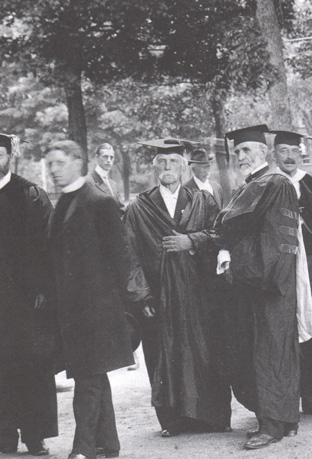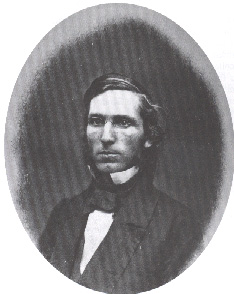 |
| *** Bowdoin College *** |
| Gen. Joshua Lawrence Chamberlain: A Dedicated Hero Home You are listening to The Battle Cry of Freedom. |
 |
| Joshua Lawrence Chamberlain entered Bowdoin College as an undergraduate in 1848, where he excelled in virtually all of his subjects. He achieved first honors in French; was a first assistant in chemistry, won honors in math and astronomy; received prizes in English, and, of course, attained first rank in Greek. Chamberlain was elected to Phi Beta Kappa, joined a literary society, for which he wrote poems, and joined a fraternity, Alpha Delta Phi. He also taught Sunday school in a nearby church during his first two years, and was the leader of the choir as a junior and senior in the First Parish Church (where, incidentally, he met his wife, the preacher's daughter). At Bowdoin, Chamberlain decided that is was time to overcome something that had been "plaguing him since childhood": a speech impediment. With characteristic determination and strong will, he set about his difficult task: "Such a condition was intolerable. It was not a thing to be avoided, but to be overcome. . .The thing now was to 'do it'. . .The writer of this knows that obstacles irremovable can be surmounted," he stated in his Early Memoirs (Deans 11). Eventually, he developed into an excellent speaker. Through his literary society, Chamberlain became acquainted with Professor of Natural and Revealed Religion Calvin Stowe, as well as his wife, abolitionist and author of Uncle Tom's Cabin Harriet Beecher Stowe. Chamberlain also disapproved of slavery, a belief rooted in his religious convictions and supported by knowing Mrs. Stowe. |
| ". . .obstacles irremovable can be surmounted." --J. L. Chamberlain |
| Chamberlain at Bowdoin Commencement Exercises, 1904 |
| Upon graduation, Chamberlain entered Bangor Theological Seminary in 1852, in order to be trained as a minister. He studied Church history in German and theology in Latin (Wallace 28). When he finished his course of study in the Seminary, he delivered an oration at his alma mater, entitled "Law and Liberty," in order to earn his master's degree. The faculty and administration at Bowdoin were so impressed that they offered Chamberlain a position for the 1855-56 academic year. He was soon promoted to the Professorship of Rhetoric and Oratory, a position he held until 1861. Chamberlain, unlike many of his associates, was a strong advocate of the liberal education: "My idea of a college course," he said in 1859, "is that it should afford a liberal education--not a special or professional one, not in any way one-sided" (Wallace 31). This caused some tension between Chamberlain and his colleagues. In August of 1862, fearful that he would join the war effort, the college granted Chamberlain a two-year leave of absence, expecting that he would travel and study in Europe. Instead, he accepted the offered military position of lieutenant-colonelcy, and thus began the most adventurous stage of his life. Upon returning a certified hero from the Civil War, he served four consecutive one-year terms as the governor of Maine. |
| In 1871, he returned to Bowdoin as President of the College, a position he would hold until 1883. He sought to update the school's attitude toward education; Bowdoin had to "accept at once the challenge of the times," Chamberlain stated (Deans 92). In his Inaugural Address, "The New Education," he said, "This is a good age. We must understand it, if we can." He placed new emphasis on modern languages; encouraged professors to treat their students as adults rather than children; and established an engineering course and a science program. He believed that women should be allowed to experience higher education, saying that "her capacities. . .are equal to those of man" (Deans 92). Chamberlain was, however, met with resistance, and often considered "radical" by his associates. Chamberlain had a deep affection for Bowdoin College, and always held education itself in high esteem. The majority of his life was spent either at the desk or behind it. This commitment to learning, the well-rounded education, and students does not come as a surprise to those familiar with his character. He was never intimidated by those who stood in his way, and was constantly determined to see his ideas through. |
 |
| J. L. Chamberlain as a student |